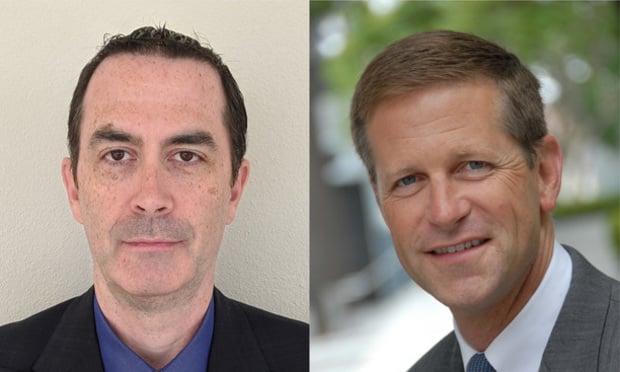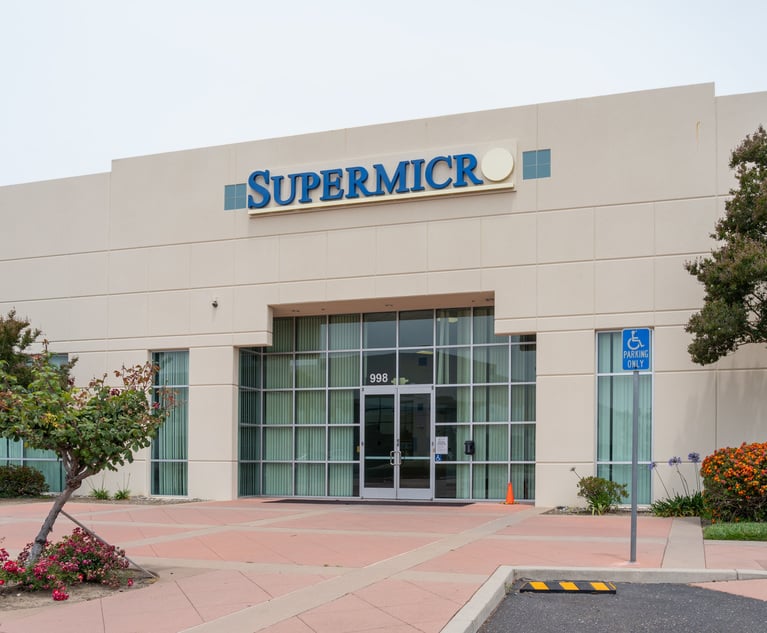Viasat Wins $49M Verdict Over Fiber Optic Technology
San Diego County jurors find that Acacia Communications failed to pay royalties but award only $1 on Viasat's trade secret claims.
July 17, 2019 at 08:39 PM
4 minute read
 Patrick Shields (left) and Kenneth M. Fitzgerald (Courtesy photos)
Patrick Shields (left) and Kenneth M. Fitzgerald (Courtesy photos)
A Southern California jury on Wednesday gave Viasat Inc. every dollar of the $49 million it was seeking in contract claims against Acacia Communications Inc. But it delivered a mixed bag on Viasat's trade secrets claims following a monthlong trial in northern San Diego County.
Superior Court jurors found that Acacia willfully and maliciously misappropriated Viasat trade secrets on fiber optic technology but delivered damages of only $1 on the trade secret portion of the case. Carlsbad-based Viasat had been seeking as much as $280 million in trade secret damages.
Viasat said it intends to seek additional royalties for the post-discovery period plus its attorneys fees. The case has been litigated over the past 3½ years in both state and federal court, with Fitzgerald Knaier's Kenneth Fitzgerald, Warren Lex's Patrick Shields and Associate General Counsel Colin Ward leading the way for Viasat.
“We're very, very pleased with the verdicts,” Ward said Wednesday afternoon. “It's a good day.”
Jurors also rejected Acacia's counterclaims for breach of contract and conversion. They found Viasat did misappropriate Acacia's trade secrets but found Viasat did not act willfully and again awarded $1. Acacia's lead trial attorney, Wolf, Greenfield & Sacks partner Michael Albert, did not immediately respond to an email requesting comment Wednesday afternoon.
The verdict comes a week after Cisco Systems Inc. announced that it intends to acquire Massachusetts-based Acacia for $2.6 billion.
The dispute stems from a collaboration 10 years ago in which Acacia hired Viasat to help design the chips used in Acacia's 100-gigabit-per-second fiber optic modems. Under the parties' license agreement, Viasat provided confidential coding structure for, among other things, soft decision forward error correction, or SDFEC, a method of encoding and decoding packet data to ensure against corrupted transmissions.
All went fine until Acacia began rolling out next generation products designed for 400 and 1,200 gigabit speeds. Acacia originally said it designed them without any help from Viasat, but at trial argued that whatever Viasat material it used was covered by the parties' license agreement.
“You don't deny doing something, if you had a right to do it,” Fitzgerald said during closing arguments last week. “Acacia had no right to use Viasat's SDFEC without paying royalties.”
Jurors awarded $49,303,982, the precise figure Fitzgerald had requested for unpaid royalties plus late fees. Fitzgerald had further argued that Acacia was unjustly enriched by $361 million based on trade secrets Viasat had shared under the license agreement. He asked jurors to award 80% of that amount, or about $280 million, but said they also could award 50% or 25%. In the end they awarded $1.
Albert had told jurors that there was no evidence Viasat considered its designs trade secrets until the litigation began and that Acacia hadn't shared them with anyone else.
Viasat's Ward said on Wednesday that the company intends to ask Superior Court Judge Timothy Casserly for additional royalties based on Acacia sales since the close of discovery and for attorneys fees. That will include cost-of-proof sanctions based on Acacia's pretrial denials of liability, he said.
Fitzgerald said Wednesday that, while the technology in the case was complex, “we tried to tell a simple story. We tried to present it as a simple case of thefts and lies,” he said. “You don't deny doing stuff if you really had a right to do it.”
Also representing Viasat were Fitzgerald Knaier's Joseph McGeady and Warren Lex's Matthew Warren.
This content has been archived. It is available through our partners, LexisNexis® and Bloomberg Law.
To view this content, please continue to their sites.
Not a Lexis Subscriber?
Subscribe Now
Not a Bloomberg Law Subscriber?
Subscribe Now
NOT FOR REPRINT
© 2025 ALM Global, LLC, All Rights Reserved. Request academic re-use from www.copyright.com. All other uses, submit a request to [email protected]. For more information visit Asset & Logo Licensing.
You Might Like
View All
California Walnut Grower and German Investment Firm Vie for Lead Plaintiff Status in Super Micro Securities Action

Apple Files Appeal to DC Circuit Aiming to Intervene in Google Search Monopoly Case
3 minute read

Trending Stories
- 1'Knowledge of Mismatch:' Fed Judge Offers Guidance on How to Hold Banks Accountable for Erroneous Transfers
- 2PAGA Claims Must Now Be 'Headed'
- 3Million-Dollar Verdict: Broward Jury Sides With Small Business
- 4'Reluctant to Trust'?: NY Courts Continue to Grapple With Complexities of Jury Diversity
- 5'Careless Execution' of Presidential Pardons Freed Convicted Sex Trafficker, US Judge Laments
Who Got The Work
J. Brugh Lower of Gibbons has entered an appearance for industrial equipment supplier Devco Corporation in a pending trademark infringement lawsuit. The suit, accusing the defendant of selling knock-off Graco products, was filed Dec. 18 in New Jersey District Court by Rivkin Radler on behalf of Graco Inc. and Graco Minnesota. The case, assigned to U.S. District Judge Zahid N. Quraishi, is 3:24-cv-11294, Graco Inc. et al v. Devco Corporation.
Who Got The Work
Rebecca Maller-Stein and Kent A. Yalowitz of Arnold & Porter Kaye Scholer have entered their appearances for Hanaco Venture Capital and its executives, Lior Prosor and David Frankel, in a pending securities lawsuit. The action, filed on Dec. 24 in New York Southern District Court by Zell, Aron & Co. on behalf of Goldeneye Advisors, accuses the defendants of negligently and fraudulently managing the plaintiff's $1 million investment. The case, assigned to U.S. District Judge Vernon S. Broderick, is 1:24-cv-09918, Goldeneye Advisors, LLC v. Hanaco Venture Capital, Ltd. et al.
Who Got The Work
Attorneys from A&O Shearman has stepped in as defense counsel for Toronto-Dominion Bank and other defendants in a pending securities class action. The suit, filed Dec. 11 in New York Southern District Court by Bleichmar Fonti & Auld, accuses the defendants of concealing the bank's 'pervasive' deficiencies in regards to its compliance with the Bank Secrecy Act and the quality of its anti-money laundering controls. The case, assigned to U.S. District Judge Arun Subramanian, is 1:24-cv-09445, Gonzalez v. The Toronto-Dominion Bank et al.
Who Got The Work
Crown Castle International, a Pennsylvania company providing shared communications infrastructure, has turned to Luke D. Wolf of Gordon Rees Scully Mansukhani to fend off a pending breach-of-contract lawsuit. The court action, filed Nov. 25 in Michigan Eastern District Court by Hooper Hathaway PC on behalf of The Town Residences LLC, accuses Crown Castle of failing to transfer approximately $30,000 in utility payments from T-Mobile in breach of a roof-top lease and assignment agreement. The case, assigned to U.S. District Judge Susan K. Declercq, is 2:24-cv-13131, The Town Residences LLC v. T-Mobile US, Inc. et al.
Who Got The Work
Wilfred P. Coronato and Daniel M. Schwartz of McCarter & English have stepped in as defense counsel to Electrolux Home Products Inc. in a pending product liability lawsuit. The court action, filed Nov. 26 in New York Eastern District Court by Poulos Lopiccolo PC and Nagel Rice LLP on behalf of David Stern, alleges that the defendant's refrigerators’ drawers and shelving repeatedly break and fall apart within months after purchase. The case, assigned to U.S. District Judge Joan M. Azrack, is 2:24-cv-08204, Stern v. Electrolux Home Products, Inc.
Featured Firms
Law Offices of Gary Martin Hays & Associates, P.C.
(470) 294-1674
Law Offices of Mark E. Salomone
(857) 444-6468
Smith & Hassler
(713) 739-1250






